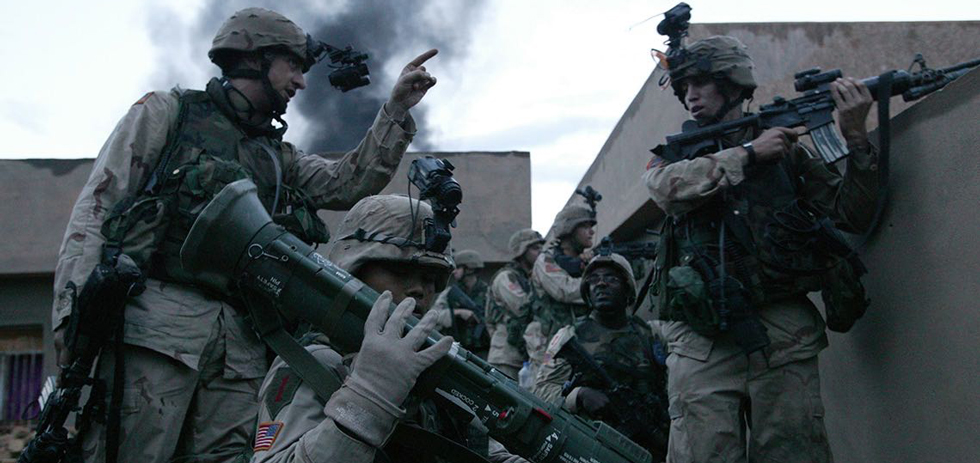
Documentaries about soldiers and war are something of a staple at film festivals internationally, and over the last few years select filmmakers have been able to find inventive and engaging approaches to the coverage of war, distinguishing these films from the relentless news coverage that followed the Iraq War from 2002 onwards. Two films this year come to mind with regards to how they each took a nuanced and creative approach to covering conflict: Laurent Bécue-Renard’s Of Men and War, which is also playing at this year’s Sydney Film Festival and which compassionately observed a group of veterans in therapy for PTSD, and Adam Curtis’ Bitter Lake, a film with a naturally wider focus on the intersection of the United States and Afghanistan leading up to the post-9/11 invasion but which masterfully employed combat footage, using didactic restraint; Curtis’ omnipotent narration doesn’t sully the footage of soldiers or the tapes from BBC war correspondents. Michael Ware and Bill Guttentag’s Only The Dead might be packed with impressive handicam footage from the perspective of US combat troops and even that of suicide bombers, but it lacks a consistent self-reflexivity, instead coming across as a hybrid of simplistic narrative account of the war and personal diary.
Michael Ware was a war correspondent in Iraq for TIME Magazine from 2003 onwards and carried around a handicam, which he used to film a lot around him – his co-workers, the streets of Baghdad, the soldiers he would come into contact with. His almost overbearing voiceover tells us he had this compulsion not only to cover the war but also to seek out those connected with Abu Musab al Zarqawi, whose brutal suicide bombings left the city of Fallujah debilitated and under his control. The brutality of many of these attacks can’t quite be understated, there were beheadings, hangings, and of course the bombings perpetrated by Zarqawi’s willing followers. In Ware’s contact with those involved in such attacks he gains an incredible access to video footage, some of which are shown in this film, but which also, at the time, turned him into something of a story in unto himself; the go-between for Al Qaeda and the media.
At some point he confesses that this position he was placed in made him feel guilty, he notes that there was an attack on an American supply base filmed entirely for him by one of the Al Qaeda sects. It’s in this idea, the role of the war correspondent, that Only The Dead only clumsily addresses. Ware placed himself in a remarkable, and remarkably reckless, position, wherein he has access to information and in fact visits (blindfolded, naturally) some of the fighters, yet he hardly ever, in voiceover, tends to dwell on the ethics of his reporting. Instead, his narration tells us of the brutality of war and how it affected those in the conflict. It swings between broad platitudes and specific information of time and place. FOXTEL was one of the financiers of this film and that comes as no real surprise, Only The Dead is less a cinematic documentary than a made-for-TV addendum to news coverage.
That said, there are some truly remarkable moments throughout, and one wishes that Ware’s voiceover and the absolutely appalling musical score – which seems designed to turn wartime footage into a glorified wartime epic, an utterly tone-deaf idea – were fully pared back, as its usage, especially early on, makes the film almost feel like propaganda, less for the war than for Ware’s career. At times Guttentag and Ware seem to recognise this, much of the Battle of Fallujah is relayed only with this visceral point-of-view photography and the immersion of this is so much more impressive than the ham-fisted raising of stakes via voiceover and score.
The film does pick up once it strays away from Ware as subject, moving to the aforementioned Battle of Fallujah and actual combat footage, but even this shift renders it as two competing films that don’t properly coalesce. Though it attempts to invest us in the lives of the American soldiers – the scenes of levity amongst chaos are oddly stirring – it’s still a very surface level approach, merely telling us a soldier’s name and a fact about their life doesn’t exactly provide insight.
Post the coverage of Zarqawi’s death the film suddenly shifts to the day Ware says was the darkest of the war for him, his inaction having some chilling consequences. Whilst it is admirable, in some respects, to admit to yourself and the world this guilt you carry, once more the voiceover almost makes it seem like Ware wants credit for his bravery in revealing his faults. It might be a shocking moment but it comes as too little, too late – Only The Dead is a war documentary that never really questions the sides in, ethics of, or role of journalists in war; it’s little more than a striking, and perhaps even important, collection of wartime footage.
Around the Staff:
| Felix Hubble |
